Related Research Articles

William Butler Yeats was an Irish poet, dramatist and writer, and one of the foremost figures of 20th-century literature. He was a driving force behind the Irish Literary Revival, and along with Lady Gregory founded the Abbey Theatre, serving as its chief during its early years. He was awarded the 1923 Nobel Prize in Literature, and later served two terms as a Senator of the Irish Free State.
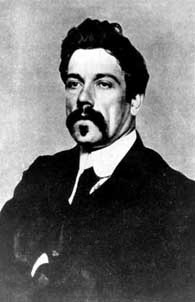
Edmund John Millington Synge was an Irish playwright, poet, writer, collector of folklore, and a key figure in the Irish Literary Revival. His best known play The Playboy of the Western World was poorly received, due to its bleak ending, depiction of Irish peasants, and idealisation of parricide, leading to hostile audience reactions and riots in Dublin during its opening run at the Abbey Theatre, which he had co-founded with W. B. Yeats and Lady Gregory. His other major works include In the Shadow of the Glen (1903), Riders to the Sea (1904), The Well of the Saints (1905), and The Tinker's Wedding (1909).

Noh is a major form of classical Japanese dance-drama that has been performed since the 14th century. Developed by Kan'ami and his son Zeami, it is the oldest major theater art that is still regularly performed today. Although the terms Noh and nōgaku are sometimes used interchangeably, nōgaku encompasses both Noh and kyōgen. Traditionally, a full nōgaku program included several Noh plays with comedic kyōgen plays in between; an abbreviated program of two Noh plays with one kyōgen piece has become common today. Optionally, the ritual performance Okina may be presented in the very beginning of nōgaku presentation.
Six Characters in Search of an Author is an Italian play by Luigi Pirandello, written and first performed in 1921. An absurdist metatheatric play about the relationship among authors, their characters, and theatre practitioners, it premiered at the Teatro Valle in Rome to a mixed reception, with shouts from the audience of "Manicomio!" ("Madhouse!") and "Incommensurabile!", a reaction to the play's illogical progression. Reception improved at subsequent performances, especially after Pirandello provided for the play's third edition, published in 1925, a foreword clarifying its structure and ideas.
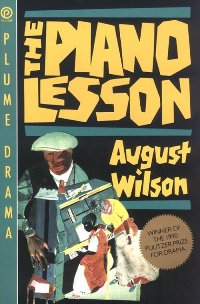
The Piano Lesson is a 1987 play by American playwright August Wilson. It is the fourth play in Wilson's The Pittsburgh Cycle. Wilson began writing this play by playing with the various answers regarding the possibility of "acquir[ing] a sense of self-worth by denying one's past". The Piano Lesson received the 1990 Pulitzer Prize for Drama.

Curlew River – A Parable for Church Performance is an English music drama, with music by Benjamin Britten to a libretto by William Plomer. The first of Britten's three 'Parables for Church Performance', the work is based on the Japanese noh play Sumidagawa by Kanze Jūrō (1395–1431), which Britten saw during a visit to Japan and the Far East in early 1956. Beyond the noh source dramatic material, Britten incorporated elements of noh treatment of theatrical time into this composition. Curlew River marked a departure in style for the remainder of the composer's creative life, paving the way for such works as Owen Wingrave, Death in Venice and the Third String Quartet.
Anne Butler Yeats was an Irish painter, costume and stage designer.

Shakuntalaa is the wife of Dushyanta and the mother of Emperor Bharata. Her story is told in the Adi Parva, the first of eighteen parts of the ancient Indian epic Mahabharata, and dramatized by many writers, the most famous adaptation being Kalidasa's play Abhijñānaśākuntala.

Hugo David Weisgall was an American composer and conductor, known chiefly for his opera and vocal music compositions.

Riders to the Sea is a play written by Irish Literary Renaissance playwright John Millington Synge. It was first performed on 25 February 1904 at the Molesworth Hall, Dublin, by the Irish National Theater Society with Helen Laird playing Maurya. A one-act tragedy, the play is set at Inishmaan in the Aran Islands, and like all of Synge's plays it is noted for capturing the poetic dialogue of rural Ireland. The plot is based not on the traditional conflict of human wills but on the hopeless struggle of a people against the impersonal but relentless cruelty of the sea.
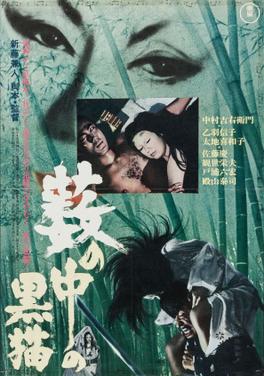
Kuroneko is a 1968 Japanese historical drama and horror film directed by Kaneto Shindō, and an adaptation of a supernatural folktale. Set during a civil war in feudal Japan, the film's plot concerns the vengeful spirits, or onryō, of a woman and her daughter-in-law, who died at the hands of a band of samurai. It stars Kichiemon Nakamura, Nobuko Otowa, and Kiwako Taichi.
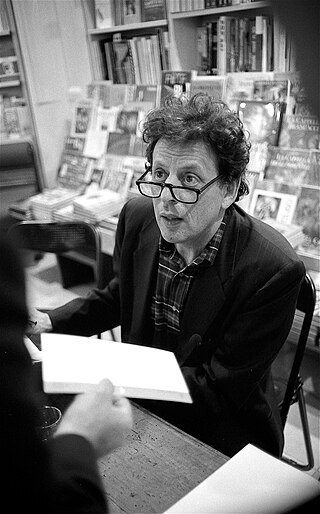
the CIVIL warS: a tree is best measured when it is down is an opera created in the early 1980s by director Robert Wilson to music by Philip Glass, David Byrne, Gavin Bryars and others. The vast five-act work has never been performed whole.
Gordon Crosse was an English composer.
Wakonda's Dream is an English-language opera composed by American Anthony Davis with a libretto by Yusef Komunyakaa. It premiered March 7, 2007 at Omaha, Nebraska's Orpheum. It is about a contemporary Ponca family and the spiritual journey of their son, who is deeply connected to a noted chief, Standing Bear, and an 1879 trial he won in a United States court.
At the Hawk's Well is a one-act play by William Butler Yeats, first performed in 1916 and published in 1917. It is one of five plays by Yeats which are loosely based on the stories of Cuchulain the mythological hero of ancient Ulster. It was the first play written in English that utilised many of the features of the Japanese Noh Theatre.

Matsukaze is a play of the third category, the woman's mode, by Kan'ami, revised by Zeami Motokiyo. One of the most highly regarded of Noh plays, it is mentioned more than any other in Zeami's own writings, and is depicted numerous times in the visual arts.
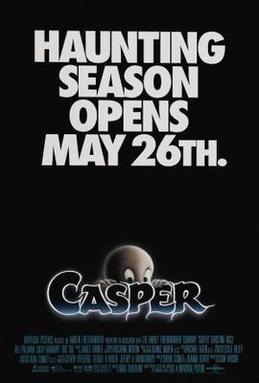
Casper is a 1995 American supernatural comedy-drama film directed by Brad Silberling, in his feature film directorial debut, based on the Harvey Comics cartoon character Casper the Friendly Ghost created by Seymour Reit and Joe Oriolo. The film stars Christina Ricci, Bill Pullman, Cathy Moriarty, and Eric Idle, with voice talents of Joe Nipote, Joe Alaskey, Brad Garrett, and the film introduction of Malachi Pearson in the title role.
Noh Hee-kyung is a South Korean television screenwriter and essayist. She is best known for her television dramas such as, That Winter, the Wind Blows (2013), It's Okay, That's Love (2014), Dear My Friends (2016), Live (2018), and Our Blues (2022).

Goddess of Marriage is a 2013 South Korean romantic comedy-drama series starring Nam Sang-mi, Kim Ji-hoon, Lee Sang-woo, Lee Tae-ran, Kim Jung-tae, Jo Min-su, Kwon Hae-hyo, Jang Young-nam and Jang Hyun-sung. It premiered on SBS on June 29, 2013, and ended on November 3, 2013, airing every Saturday and Sunday at 21:50 for 36 episodes.

This Is No Fairytale is the fourth studio album by Dutch symphonic black metal band Carach Angren. It was released on 23 February 2015 via Season of Mist. The witch's hand on the cover art of the album is actually the hand of Dennis "Seregor" Droomers' grandmother.
References
- ↑ Quoted in liner notes for Lyrita recording of the one-act opera, SRCD.313
- 1 2 "Contextual notes on Yeats' "Purgatory"". ibiblio.org. Retrieved 2021-06-17.
- ↑ Imhoff, Ernest F. (16 September 1991). "Overflow crowd hears young composer's 'Purgatory'". baltimoresun.com. Retrieved 2021-06-17.
- ↑ "New Chamber Opera at Peabody". Wayback Machine . Archived from the original on 5 July 2004. Retrieved 2021-06-18.
- ↑ Karel, Anastasia (November 2004). "William Elliott collection, at pg. 19" (PDF). The New York Public Library for the Performing Arts. Retrieved 2021-06-18.